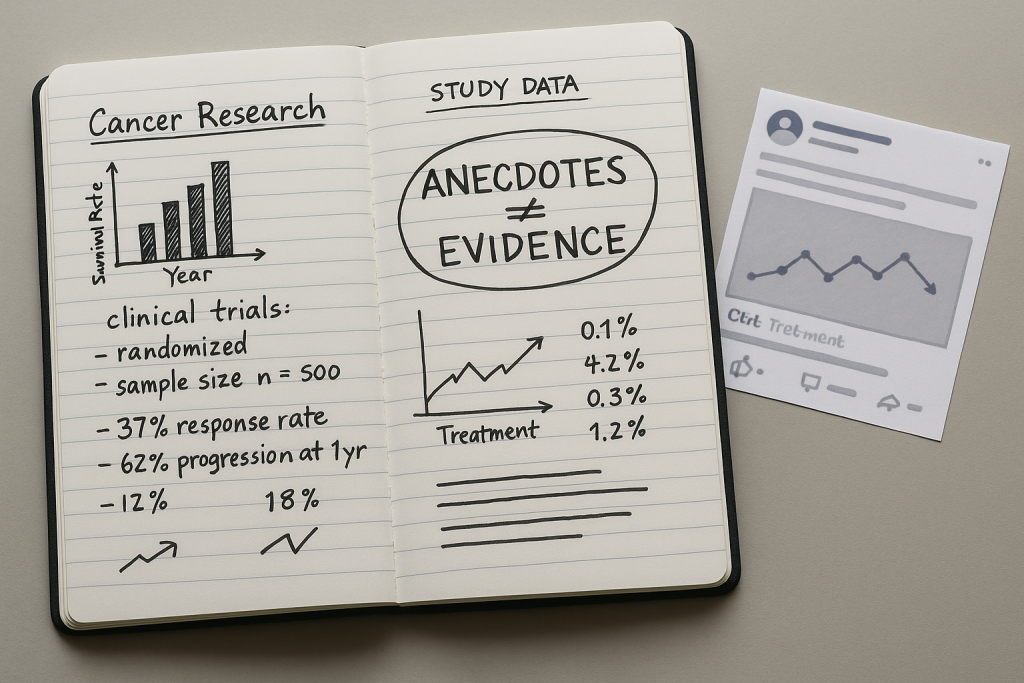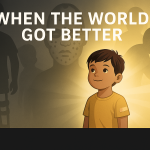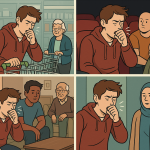It started with a story.
A man—Joe Tippens—said he had terminal cancer. Doctors had given up hope. So, with nothing to lose, he tried something unconventional: fenbendazole, a dog dewormer sold at feed stores.
And then… he got better.1
That’s all it took.
One story.
One YouTube video.
And suddenly, millions of people were wondering if the cure for cancer had been sitting in a pet aisle all along.
The Appeal of the “Hidden Cure”
It’s not hard to see why this story exploded:
- A desperate underdog defying the odds
- A dirt-cheap drug with no Big Pharma markup
- The suggestion that someone is hiding the truth from us
- And above all: hope
But this is where things get dangerous.
Because the leap from “this helped someone” to “this cures cancer and they’re hiding it from us” skips all the steps that protect people from false hope—and real harm.
Why Anecdotes Aren’t Evidence
Let’s say someone takes fenbendazole, and then their cancer improves. Does that mean the fenben cured their cancer?
Not necessarily.
Here’s why:
- Some cancers go into remission for reasons we don’t fully understand
- Scans and diagnoses aren’t always 100% accurate
- Many people who try fenben also receive conventional treatments, like chemotherapy or radiation—but attribute their recovery only to the dewormer
- Sometimes, it’s just luck or biology
This is why we don’t approve drugs based on individual stories.
This is why we need clinical trials—not YouTube testimonials.
Why Clinical Trials Matter
Clinical trials are designed to answer one question with certainty:
Did this treatment actually help people in a way that wasn’t just chance, bias, or wishful thinking?
They do that by:
- Randomizing who gets the drug and who doesn’t
- Using large groups of patients to eliminate flukes
- Controlling for other variables
- Measuring specific outcomes like tumor size, survival rate, quality of life
- Monitoring side effects that anecdotes never mention
That’s how science works.
And fenbendazole hasn’t gone through that process—not even close.2
But What If It Does Work Someday?
If fenbendazole has real anti-cancer properties, the scientific community would want to know. And researchers are looking into it—but so far, studies in humans are lacking or extremely limited. Indeed, some early preclinical studies in animals have explored fenbendazole’s impact on cancer cell structures, but these findings have not translated into effective or proven human treatments.3
And here’s an important truth:
There are dozens of potential cancer treatments that are far more promising than fenbendazole.4
From experimental immunotherapies to gene-targeting drugs to combination regimens for resistant tumors—the real breakthroughs are happening in labs and clinical trials all over the world, not in dog medicine aisles.
Why Do People Think Fenben Works?
Some of the most common claims are:
- “It starves cancer cells of sugar.”
❌ This is based on an oversimplified view of how cancer uses glucose. Almost every cell in your body uses glucose. Cutting it off doesn’t just target cancer. - “It disrupts microtubules in cancer cells.”
✅ Fenben does affect microtubules—in parasites. Some chemotherapies do too. But that doesn’t mean fenben is safe or effective in humans at treating cancer. - “It worked for this one person.”
❌ Individual stories are compelling, but they’re not controlled, repeatable, or reliable enough to build treatment guidelines on. For every story like Joe Tippens, there are many others who tried fenben and didn’t survive—but we don’t hear those.
For deeper dives on these claims, you can check out:
- National Library of Medicine: How cancer patients get fake cancer information
- Public Health Communications: Vaccine opponents promote a deworming drug as a cancer cure
What’s Actually Giving Us Hope
If you’re looking for real breakthroughs, they’re happening right now, backed by data and clinical evidence:
- Cancer death rates have dropped 33% since 1991 in the U.S. – that’s over 3.8 million lives saved5
- Immunotherapies like checkpoint inhibitors are changing outcomes for melanoma, lung cancer, and more
- CAR-T cell therapy, a treatment that genetically reprograms your immune cells to fight cancer, is curing some forms of leukemia and lymphoma6
- mRNA cancer vaccines are now in human trials, applying the same technology used in COVID vaccines to target tumors7
- AI-assisted early detection tools are helping catch cancer earlier, when it’s most treatable
- And many cancers that were once automatic death sentences—like pediatric leukemia—now have survival rates over 90%8
The progress is real. The science is working. And it’s being led by researchers who aren’t selling miracle pills on the internet—they’re running trials, analyzing data, and improving lives.
The Bottom Line
While it may sound compelling, the fenbendazole story distracts from real, proven medical advances that save lives every day.
It takes our attention—and sometimes our treatment plans—away from the real advances that can actually save lives.
Yes, be skeptical of Big Pharma’s motives.
Yes, advocate for cheaper drugs, more transparency, and better access.
But don’t trade science for stories.
Cancer doesn’t care about what went viral.
But it does respond to what works.
If this helped clear up some confusion—or sparked more questions—head back to the Facebook post and tell us what you think. Let’s talk about real hope, rooted in real progress.
- https://pmc.ncbi.nlm.nih.gov/articles/PMC9650234/ ↩︎
- https://clinicaltrials.gov ↩︎
- https://ar.iiarjournals.org/content/44/9/3725 ↩︎
- https://www.cancer.gov/about-cancer/treatment/research ↩︎
- https://www.cancer.org/research/cancer-facts-statistics.html ↩︎
- https://www.cancer.org/cancer/types/leukemia-in-children/treating/immunotherapy.html ↩︎
- https://investors.modernatx.com/news/news-details/2023/Moderna-And-Merck-Announce-mRNA-4157-V940-In-Combination-with-KeytrudaR-Pembrolizumab-Demonstrated-Continued-Improvement-in-Recurrence-Free-Survival-and-Distant-Metastasis-Free-Survival-in-Patients-with-High-Risk-Stage-IIIIV-Melanoma-Following-Comple/default.aspx ↩︎
- https://www.cancer.gov/types/leukemia/hp/child-all-treatment-pdq ↩︎
Last Updated on July 15, 2025







